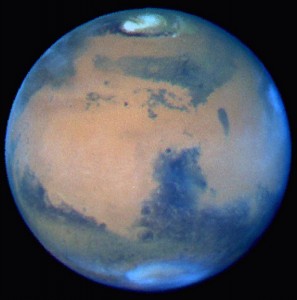Home »

Is colonizing Mars the answer to the world’s woes?
Count me out! That’s right, I don’t want to join the 170,000 or so who have applied to join the Mars One expedition that hopes to be setting up a human colony on the Red Planet by the year 2023 or thereabouts.
Even if it wasn’t a one-way journey, I don’t think I’d be interested. I’ve seen pictures of the so-called “colony” on Mars. It looks like a collection of gleaming porcelain urinals set upside down on the lifeless Martian landscape which is so bleak that it makes Death Valley look like the Garden of Eden.
 No lakes. No rivers. No trees. No flowers. No fast food outlets. No theatres or parks filled with children and birds singing in the trees. Not even a decent hockey arena or ski hill with fresh white snow. Just miles and miles of arid red rock, jagged craters and scabby looking mountains soaring into the sterile Martian sky devoid of atmosphere. It makes me shudder just to think about it even though there’s supposed to be ice near the Martian poles and the possibility of water elsewhere. But the only flash of green life on Mars according to the scientists is bacteria.
No lakes. No rivers. No trees. No flowers. No fast food outlets. No theatres or parks filled with children and birds singing in the trees. Not even a decent hockey arena or ski hill with fresh white snow. Just miles and miles of arid red rock, jagged craters and scabby looking mountains soaring into the sterile Martian sky devoid of atmosphere. It makes me shudder just to think about it even though there’s supposed to be ice near the Martian poles and the possibility of water elsewhere. But the only flash of green life on Mars according to the scientists is bacteria.
Bacteria!
If you can explain why supposedly intelligent people, including more than 6,000 from Canada, are ready to mortgage their houses and cash in their RSPs for a six month space flight to Mars in order to spend the rest of their lives living with bacteria, I’ll donate this space next week for you to explain why. That’s a promise. And if you’re considering taking up the challenge, here’s just a few difficulties Mars colonizers will face.
Despite its warm, red glow, it’s cold on Mars! Even at the Martian equator, the temperature seldom rises above freezing and at night can fall to 189 below F. The poles are even colder, close to absolute zero, minus 417 F. It’s so cold they’re even considering covering the Martian living pods with dirt to insulate them at night. The atmosphere is 95 per cent carbon dioxide and only 0.2 per cent oxygen so you won’t be stepping outside for a breath of fresh air. And Martian gravity is only 38 per cent of Earth’s, which means you’ll lose much of your bone and muscle density and you won’t be able to walk or stand up if you somehow manage to return to your home planet. Club Med Mars isn’t. And you would need to train for seven years to be one of the “lucky” ones selected for the Mars voyage. Goodbye life as you’ve ever known it.
Indeed, Mars One Ambassador and Nobel Prize physicist Gerard’t Hoof lays down some pretty stringent contingents for wannabe Mars space cadets. Such extra-terrestrial travelers would have to have “intelligence, resourcefulness, courage, determination and skill as well as psychological stability,” he warns. I guess that rules me out and maybe some of you reading this too. The application process closed Aug. 31 and Mars One reviewers are now going to select 50 to 100 candidates from 300 regions in the world. These will be later whittled to 30 to 40 candidates for the first colonizer flight not expected to take place until 2022 followed by several successive flights every two years after that. The first teams will build foundations for the teams that follow in man’s first attempt to colonize the solar system. Considering the checkered history of colonization on good ol’ Mother Earth, the odds in Vegas aren’t likely to be good for outer space colonization.
Or am I being too pessimistic, cynical or whatever?
When you consider the daily horror stories coming out of Syria, Afghanistan, Iraq and the so-called Democratic Republic of the Congo where child soldiers of the Lord’s Resistance Army hold sway, I wonder if I’m being cynical enough. And for that matter, what about Canada where we have children killing children as happened in Manitoba recently?
On this planet, the climate grows warmer every year, the oceans are rising and becoming more acidic and smog chokes most of our great cities. Scientists like David Suzuki say we’re running out of time until ecological collapse and the American president wants to go to war again. The list goes on and needs no further elaboration – and when I really think about it – developing a colony on Mars may not be such a bad idea after all.
– Gerry Warner is a retired journalist and Cranbrook City Councillor. His opinions are his own.








